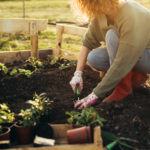URGENT news: Growing food in a TOXIC world
 (NaturalHealth365) Growing your own garden has long been touted for its known physical and mental health benefits. But with the increasing concerns over the environment – largely fueled by man-made environmental disasters like the catastrophic Ohio train derailment back in February – many are questioning whether gardening is still a safe pastime to enjoy.
(NaturalHealth365) Growing your own garden has long been touted for its known physical and mental health benefits. But with the increasing concerns over the environment – largely fueled by man-made environmental disasters like the catastrophic Ohio train derailment back in February – many are questioning whether gardening is still a safe pastime to enjoy.
One gardener recently posted some important insights about this very topic to her popular YouTube channel.
Growing food in a home garden is becoming increasingly popular – but is it safe in this toxic world?
Humans have grown gardens for centuries, but there’s certainly been an uptick in interest within the past few years. According to data compiled by the website Garden Pals, about 18.3 million people became new gardeners during the COVID-19 pandemic, and online sales of gardening goods doubled during that time.
Overall, estimates suggest that at least a third of U.S. households grow their own veggies, fruits, and other foods.
This trend of getting into the dirt and taking more control over one’s health is something worth celebrating. However, the increasing prevalence of pesticides, heavy metals, and other toxins in our soil and water have many gardeners worried about what exactly is in the food they’re growing in their own backyards.
To this point, YouTuber Growfully With Jenna recently posed a question along with a video she posted on February 20, 2023: “Are we gardening in a toxic world?” Check out her very informative video – below:
Jenna argues that while it “seems the answer is yes,” there are things current and would-be gardeners can do. One strategy, for example, is something known as phytoremediation management, or “what do we do with plants AFTER they’ve soaked up the toxins.”
Phytoremediation is defined in a 2021 paper from the Journal of Bioremediation & Biodegradation as “a plant-based method” that leverages plants’ abilities to “concentrate elements and chemicals from the environment as well as detoxify different contaminants” in the soil, air, and water. Basically, it’s a strategy that uses plants to absorb contaminants from the environment so there are fewer of these contaminants in our soil, air, water, groundwater, and food.
To utilize phytoremediation, gardeners should consider planting non-edible plants in and around their garden that are known to hyperaccumulate heavy metals, including Helianthus annulus (sunflowers), industrial hemp, Brassica juncea (brown mustard greens), Sorghastrum nutans (yellow Indiangrass), and even willow and poplar trees.
Jenna also lists some incredible resources for people who are interested in learning more about how to make their gardening journeys safer and more nutritious. These resources include:
- The Ohio Ecological Food and Farm Association (an excellent resource for any gardeners in Ohio)
- An Overview of Phytoremediation Technology
- Beyond Pesticides
- At-Home Herbicide Bioassay
- Rx Soil Testing
Jenna’s video has already amassed nearly 30,000 views as of March 2, 2023. If you currently grow a garden or are thinking of picking up gardening as a habit soon, this insightful video is for you.
Environmental concerns must be addressed so we can all take advantage of known health benefits of gardening
A variety of research studies show that gardening is indeed good for human health and offers benefits that go beyond the health benefits of simply eating more fruits and veggies. These benefits include (and aren’t limited to):
- Better mood
- Increased opportunity for vitamin D exposure, aerobic exercise, and socialization
- Decreased dementia risk
- Improved health, dietary habits, and learning development in children
The bottom line: If you feel called to grow a garden, go for it! Just be sure that you add some health- and environmentally-friendly strategies to your gardening toolkit.
Sources for this article include:
Gardenpals.com
EPA.gov
EPA.gov
NIH.gov
Sciencedirect.com
Omicsonline.org
Frontiersin.org
AARP.org
Land8.com
Oeffa.org
Beyondpesticides.org
Edis.ifas.ufl.edu
Rxsoil.com



